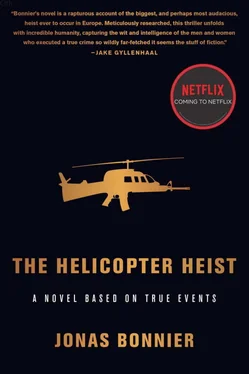Before Maloof has even closed the cabin door, the boat has pushed off from the jetty and started its journey north. Kluger quickly guides the helicopter higher, and they continue toward Norsborg.
5:53 a.m.
It’s barely two minutes from Lake Alby to the gravel pit in Norsborg. They are still flying low, and now the American is checking his GPS every ten or so seconds. Sami, sitting next to him, doesn’t need to ask about the red light.
After about a minute, they spot the lights of the cars. They’re arranged in a triangle, just like the flashlights at the takeoff site in Stora Skuggan a few hours earlier.
Sami points and the American nods.
The landing happens quickly, without any drama.
Ezra comes running from one of the cars with a couple of gas cans. He puts them down next to the helicopter, whose engine has just been turned off, and Sami then runs back to the car with him.
They drive away without saying goodbye to anyone.
Nordgren quickly hugs Maloof. The feeling of having succeeded has started to creep through his body, no matter how much he tries to fight it. He isn’t back in Lidingö yet, he’s still not out of the woods.
But he’s close.
He runs over to the car where Jonas Wallmark, one of his childhood friends, is waiting. It’s not the first time Wallmark has been the driver in this kind of situation.
Maloof and Kluger are left alone by the helicopter. The American is busy refueling from one of the cans, and he nods. He’s calmer now.
“It felt good to be up in the air again,” he says.
Maloof nods. He doesn’t know what the pilot means, but he doesn’t care. When Kluger lifts off in the white helicopter a few minutes later, disappearing toward a horizon that is slowly turning blue, Maloof knows he will never see or hear of the man again.
He goes over to the lone car left at the gravel pit in Norsborg. He glances at his watch. It’s just turned six. They’re almost half an hour behind schedule. He’ll probably get stuck in the morning traffic heading for Södertälje.
He opens the passenger’s side door of the BMW and climbs in.
The shock renders him speechless.
Petrovic is sitting behind the wheel.
“But…” Maloof stammers. “What the hell… are you doing here?”
“You texted me and told me to come.”
Petrovic had been confused when he got the message after tricking the police to the north of Täby.
Up until that point, the plan had been for him to drive the boat and the money.
“Texted?” Maloof asks. He can’t believe this is happening. “Wait… so who the hell’s driving the boat?”
Petrovic looks at him. At first, he doesn’t seem to understand. “What?”
“If you’re here, who’s driving the boat?” Maloof repeats. “Someone drove off with the money. If it wasn’t you…?”
Stenson’s ordinary working hours ended one hour after the first publication, the one he alone was responsible for: images of the white helicopter lifting off from the roof in Västberga. By seven, people had started pouring into the office, and Stenson knew he should have gone home after a long night. But it was impossible. There was a sense in the air that something historic had happened, and this was his story, even if the paper’s head start over its main competitor had narrowed. The tabloids, morning papers and Swedish public media were all at the scene out in Västberga, along with a huge number of foreign correspondents—all starved of any internationally interesting news from the Scandinavian backwater where they had been stationed. The scene at the crossroads of Västberga Allé and Vretensborgsvägen was chaotic, and a press conference had been scheduled at police HQ in Kungsholmen for later that day.
Stenson darted between the desks with very little to do, following the foreign coverage of the robbery with the rest of his colleagues. Their European colleagues from the closest time zones were already broadcasting the news by eight, but it took a few hours before the Americans woke up.
On CBS, the focus was on the fact that no one had been hurt. There was talk of the heist being like something from a Hollywood movie, and when they described the skillful robbers, they used an image of Tom Cruise in an action sequence of some kind.
On CNN, they concluded that reality, yet again, had exceeded fiction.
The online headlines from the English papers were, in typical fashion, all humorous plays on words:
“Chopper Heist Is Swede-ly Done,” wrote the Sun. “It was a heist that would have caught the imagination of any Hollywood producer,” wrote the Times. “But not even Danny Ocean—despite having three George Clooney films to play with—thought of using a helicopter.”
The coverage seemed much more focused on reviewing the robbers’ methods, drawing parallels to the world of film, than it was on reporting a crime.
Stenson knew that he wouldn’t be invited to the press conference at police headquarters after lunch; he was just a temp from the recruitment company. But at eleven thirty, the paper’s star reporter—who had won out and been awarded the prestigious job of covering the robbery by the deputy editor—came over to his desk.
“You can come along if you want, Stenson,” he said. “You were first, after all.”
Tor Stenson nodded. His pride swelled like a sponge in a bathtub.
The American airlines would have been out of the question. With Sami Farhan’s criminal record, the obligatory tourist visa applications made it impossible for him to fly via the United States.
Both Air France and British Airways flew from Arlanda to the Dominican Republic, via Paris and London respectively. But the flights also left at six thirty in the morning, and such tight margins weren’t acceptable. If everything had gone according to plan, they were meant to have landed in Norsborg at five thirty. Having only an hour to make it up to Arlanda after that would have been too tight.
That left Swiss Air as the only viable alternative. The first leg left at ten in the morning, and he would land—after a change in Zurich, and thanks to the time difference—in Punta Cana early the same evening.
—
When Sami climbed out of the car at Arlanda and walked into the international terminal, heading for the check-in desks, he felt as though a huge spotlight on the ceiling were following his every move through the departure hall. It seemed to him that everyone was staring, that the police officers talking outside the 7-Eleven were getting ready to pounce.
By the time he handed over his passport to collect his ticket, he could barely talk, his mouth was as dry as sand, and he pulled at the neckband of his T-shirt so hard that it stretched. A few minutes later, standing in the line for Security, his legs were trembling so much that he was shaking all over.
It wasn’t even seven in the morning yet.
Just over an hour earlier, he had been standing on a rooftop in Västberga, about to climb into a helicopter.
He could barely believe it when they let him through Security, and when he sat down to wait by the still-empty gate, he couldn’t shake the feeling that it was all just a trap. They were giving him false hope, they wouldn’t let him leave the country.
—
During the brief moments when Sami failed to keep up his cautious nervousness, two opposing feelings rose inside him:
The first was a bubbling feeling of joy, something like letting go of a small plastic ball you’ve been pressing to the bottom of the bath.
They had done it. Shit, they had actually managed to do it.
Читать дальше












